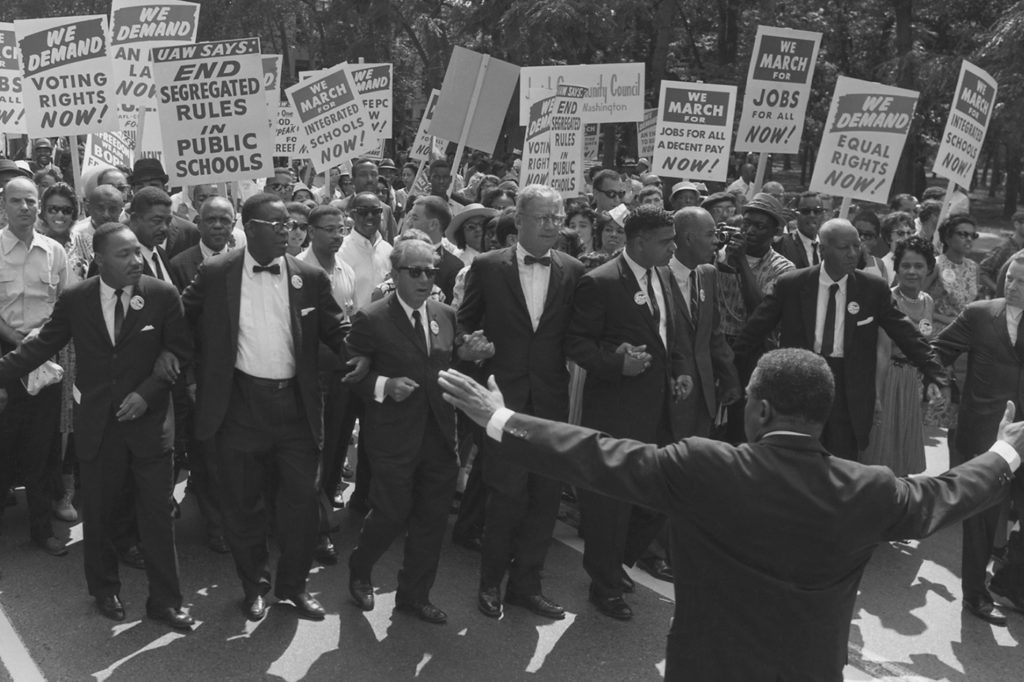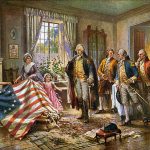This essay is part of our series on Race and Racism in America. See the full collection here.
In the wake of the murder of George Floyd, righteous anger moved many Americans to engage in necessary and appropriate peaceful protests for justice and criminal justice reform. These protests were co-opted, however, and we have seen rioting, looting, and civil unrest. Factions in our culture are attempting to hijack the civil rights movement to advance social chaos and to advance the culture of death.
For those of us who grieve Mr. Floyd’s death, who want to fight racism, but also who believe that we must maintain the just rule of law, where do we go? What can do we do?
For those of us who grieve Mr. Floyd’s death, who want to fight racism, but also who believe that we must maintain the just rule of law, where do we go? What can do we do?
Love and Solidarity
Start your day with Public Discourse
Sign up and get our daily essays sent straight to your inbox.First, we are called to put on the armor of love. Those of us who are Christians must put on the loving eyes of Christ to see the pain of Mr. Floyd, his family, and countless African Americans, like me, who are hurting, angry, and scared.
First, we are called to put on the armor of love. Those of us who are Christians must put on the loving eyes of Christ to see the pain of Mr. Floyd, his family, and countless African Americans, like me, who are hurting, angry, and scared.
Thank God, our country has made extraordinary advances in racial unity and civil rights, and the overwhelming majority of law enforcement officials are incredible people who serve, protect, and defend their fellow citizens. However, the residue of over 200 years of slavery still remains, as do the effects of nearly 100 additional years of Jim Crow segregation and severe racism, in which blacks were treated as second-class citizens. For African Americans, meaningful freedom did not begin until the passage of the Civil Rights Act of 1964 and the Voting Rights Act of 1965. Because of this history, there remains an aspect of our cultural psyche in some corners that still sees dark skin as less valuable, as less dignified.
Seeing the images of Mr. Floyd in his last moments, I was painfully reminded of other images and stories of black men and women experiencing dehumanization, disrespect, excessive force, and even death at the hands of law enforcement officers. I am reminded of the video images of the brutal beating of Rodney King that took place in 1991 in Los Angeles. I am reminded of hearing about the fatal beating of Malice Green, who was killed by police officers in 1992 in Detroit, just miles from where I grew up. My mind is flooded with images of Philando Castile, Walter Scott, and Eric Garner.
Despite incredible gains over the last several decades, parts of our criminal justice system continue to exhibit racial bias, discrimination, and inadequate legal resources for the accused. Yes, African Americans do commit crimes. However, that reality does not justify the instances of police misconduct, excessive force, and excessive sentencing that African Americans continue to face.
Yes, African Americans do commit crimes. However, that reality does not justify the instances of police misconduct, excessive force, and excessive sentencing that African Americans continue to face.
For those of us who believe in the power of love, and especially for those of us who believe that God is love incarnate, now is the time to respond. Our hearts must stretch in solidarity with the pain and injustices that our black brothers and sisters face.
Love demands this. Christ demands it.
Prayer and Action
Second, we are called not only to pray but also to act for justice, because faith without works is dead. Faith communities provide leadership by coming together in a sustained way to atone for the sins of our country, including racism, and to call upon God’s mercy to heal our nation.
Regular ecumenical gatherings, prayer meetings, and communal forums for racial healing and forgiveness, like the Truth and Reconciliation efforts in South Africa, would go a long way to heal the pain of the past and move forward into the promise of the future. Under the racist apartheid regime in South Africa, black Africans were victims of unspeakable evils that have similarities to what African Americans suffered during twentieth-century Jim Crow segregation and the KKK’s domestic terrorism in the South, and under the hostility in parts of the North. When Nelson Mandela was elected president and apartheid ended in 1994, Mandela chose a path of reconciliation instead of retribution. The Truth and Reconciliation Commission hearings about the evils of apartheid allowed victims to be heard and perpetrators to confess. More than anything, the Truth and Reconciliation Commission led to healing and forgiveness among peoples. In the United States, such a healing process has never really taken place. Neither a person nor a country can “just move on” from deep woundedness. People and nations need healing to be fully free, functioning, and healthy. In our country, law enforcement officials who have committed criminal acts of brutality or misconduct should be removed and appropriately charged. Simultaneously, however, local churches, community groups, civic associations, and law enforcement officials should create forums in which the community can dialogue, responsibility for failures can be taken, forgiveness can occur, and healing can take place.
Furthermore, faith communities should engage in peaceful, nonviolent demonstrations and grassroots efforts to seek legitimate criminal justice reforms that protect the dignity and civil rights of citizens, respect the vital role of law enforcement, and uphold the rule of law. Many of us who are part of the pro-life movement regularly march, engage in activism, fast, pray, and seek God’s mercy to end the evil of abortion, even though we have never committed an abortion or participated in one. We can do the same for the sin of racism.
Police and the Rule of Law
Third, we are called to reject attempts to hijack Mr. Floyd’s death to create social disorder and destroy the rule of law.
Rioting and looting are crimes that make it more likely that black men like me will face tragic encounters with law enforcement in the future. The rule of law—when properly enforced—protects the life, rights, and liberties of every citizen. It was a breakdown in the rule of law that caused Mr. Floyd’s death. Calls to further erode the rule of law will only further deprive African Americans, and all other citizens, of their dignity, their rights, and their freedoms.
Rebirth of the American Civil Rights Project
Fourth and finally, we are called to give new birth to the civil rights movement and finally fulfill the promise of the American civil rights project, for which so many fought and died. This new birth of civil rights should be advanced in all sectors of American society, from the criminal justice system to healthcare, from education to commerce. This new birth of civil rights should be founded on the same principles as the first: the dignity of every human life, the right to life and liberty of every person, and the rights of conscience and religious freedom.
We cannot expect to end racism until we, as a country, value and protect the dignity of every life from conception to natural death. In part, our country still suffers from racism because we are failing to defend the dignity and right to life of every human being, no matter the person’s color, no matter the person’s usefulness, and no matter the person’s stage of development.
Unfortunately, forces within our culture are attempting to co-opt the civil rights movement by destroying its foundation in natural law and replacing that foundation with the bankrupt culture of death. These forces hijacking the civil rights movement seek to replace the movement’s foundational belief in the God-given human dignity of every life with a pro-abortion, anti-family, and anti-faith agenda. This misguided agenda would only further decimate the black community as well as the entire country. If all black lives matter, which they intrinsically do, then the over 15 million black unborn babies aborted since Roe v. Wade must also matter. If we truly believe that all black lives matter, those who seek racial equality should be focused on empowering communities of color, and not on promoting abortion rights, gender ideology, and the destruction of the black family.
I am blessed to lead the Christ Medicus Foundation, a nonprofit that works to protect the dignity of every patient through healthcare policy, defend the religious freedom of healthcare workers, and expand access to medical care, particularly for underserved communities of color and other vulnerable populations most in need. Our commitment to human dignity, safeguarding civil rights in healthcare, and expanding medical access for the materially impoverished and vulnerable comes from the heart of Catholic teaching. We all have a moral obligation to love our neighbor and to share God’s love for each person, no matter their race, color, religion, or condition.
In spite of the obstacles, I believe that a new birth of civil rights can succeed. A new birth of civil rights in our nation will only be possible, though, if all Americans who believe in the God-given value of every life come together to fight against racism, inequality of opportunity, and indifference. It will require federal and state law to properly safeguard the right to life of all people and the right of religious freedom across all arenas. It will require people of faith to come together to pray, act, and witness to God’s love by forming new, faith-based structures that meet the needs of God’s children: from community organizations that heal the hearts of fatherless children, to virtue-based education; from cutting-edge, faith-based medical centers that care for the vulnerable, to health-sharing ministries that build up the communal bonds of society.
Above all else, for a new birth of civil rights in our country to succeed, we must humbly remember who we truly are: children of God, equal in our dignity, and all in need of grace.













